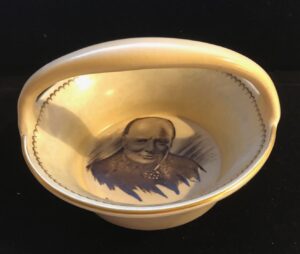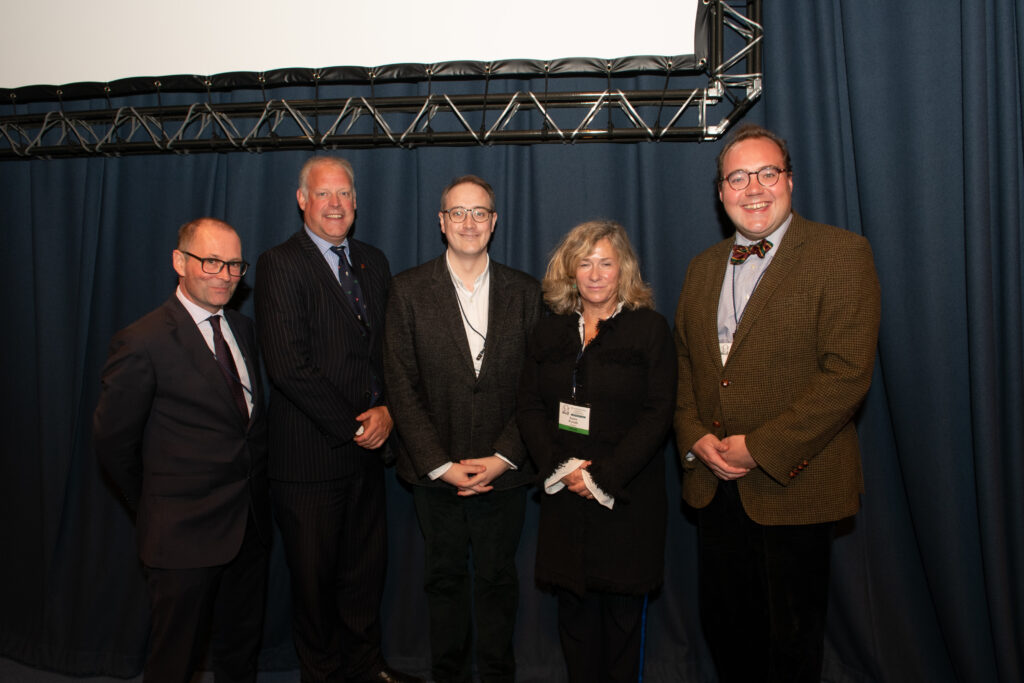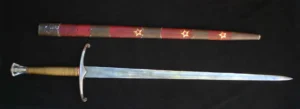
Bulletin #186 — Nov 2023
The Wee Dram

"Churchill and Scotland" panel (left to right): Allen Packwood (moderator), Neil McLennan, Alastair Stewart, Sonia Purnell, Andrew Liddle (Photo: ICS)
October 30, 2023
A Personal View of the 2023 Churchill Conference
By ALASTAIR STEWART
There is always a danger of writing too much about something too close to you. In the case of the International Churchill Conference held this year in Edinburgh between October 5 and 7, that danger is very real, given the venue is five minutes from my front door!
The conference was a resounding success. Many delegates had come from across the world, and what a pleasure it was to meet everyone. But one moment springs to mind when Neil McLennan, when presenting during the “Churchill and Scotland“ panel, asked for a show of hands of those from Scotland itself. The answer was less than five from a 300-strong auditorium. (To watch a video of the panel, please CLICK HERE.)
To consider this is not to denigrate the conference, but to enquire seriously why no one jumped on a bus across central Edinburgh and joined us on Morrison Street at the Edinburgh International Conference Centre. It cannot be emphasised enough how small Edinburgh is, and how local the conference was.

2024 International Churchill Conference
In truth, I was sure there would be placards and a good old-fashioned protest. Where was the same daily pugilistic spirit seen on social media that accuses Churchill of hating Scotland, abandoning the 51st Highland Division at St Valery-en-Cauxy in 1940 or “Rolled the Tanks” in Glasgow, 1919 or the lesser-known idea that Churchill personally deployed the famed Black Watch in Dundee in 1911 against strikers.
Scottish political culture is a different beast from the rest of the UK. Our history is our modern politics. Look no further than the arguments over disintegrating our 316-year political Union with England, Wales and Northern Ireland. Scottish online commentary treats “Churchill“ like “Thatcher” and a synonym for “Westminster” and “English imperialism.”
And it does not stop with an aggrieved and ill-informed Twitterati. Nationalism is a vulgar business at the best of times, but when it becomes official, trouble looms. After all, in 2019, the elected Member of the Scottish Parliament, Ross Greer, tweeted that Sir Winston Churchill was a “white supremacist” and a “mass murderer.”
Greer is a perfectly amiable fellow if you meet him, but he meant what he said. He also doubled down and cooly withstood the likes of Piers Morgan on Good Morning Britain (I even tried to skewer him on BBC Radio Scotland).
The question was less about why Scotland’s youngest MSP said what he did, but why he and many others his age sincerely believed Churchill was no better than his greatest nemesis. And this was over a year before the reactionary anti-racism hysteria started arbitrarily pulling down statues.
As historian Gordon Barclay would attest, perhaps the single most prominent allegation against Churchill in Scotland is he personally sent 10,000 soldiers, along with tanks, artillery and machine guns, to attack 60,000 striking Red Clydeside demonstrators in Glasgow in 1919 who were marching for a forty-hour work week.
In 2020, these myths even made it onto an exam key of the Scottish Qualifications Authority before the error was corrected. Barclay’s latest book, Tanks on the Streets?: The Battle of George Square, Glasgow, 1919, is a fantastic read and a worthwhile exploration of the history and how these lies morph into the contemporary zeitgeist and anti-unionist arguments in Scotland.
Second is the prevailing myth that Churchill was inhumane and not only personally exacerbated the Bengal famine but took sheer delight in the zero-sum preservation of white Britons over Indians. Marxist writer Tariq Ali’s new book Winston Churchill: His Times, His Crimes is a worthwhile purchase if only to have to hand the latest litany of accusations made against the former prime minister.
The defining characteristic between Churchill’s “crimes” and the perception of the man in Scotland is vindictiveness. Plenty of historical figures did not like this and that country. President Joe Biden is anecdotally no great fan of the United Kingdom. This would likely overtake his reputation if outrageous policies betrayed a passive disinterest.
With Churchill, there are none. But the myths of his actions have morphed into the unfounded accusation that he hated Scotland with a visceral, perrenial loathing. The myths endure because there is a clique which feels bound to return this animus with the same degree they incorrectly perceive it.
To some Scots, Churchill loathed Scotland with—they assert—precisely the same disdain as he did Bengalis. His hostility was not just overt but passive. Churchill relished sending in the guns to quash Scottish labourers and working-class men but equally delighted in doing nothing when he could get away with it, as in St Valery twenty years later.
Even on the best of days, the argument is psychotic. It requires a degree of premeditation which is non-existent, and to have been truly executed, it must have been shared, covered up and agreed with by innumerable government and cabinet ministers, civil servants, civilians and an incalculable number of servicemen over a 90-year life.
How best to correct this injustice? We can quote the references Churchill made to his Scottish wife, Scottish constituency and Scottish regiment all day. We can spend another day quoting his love for whisky and Scottish food before we take another week to get into his Scottish professional and personal connections and visits to Scotland. But the damage is deep rooted.
In August 2020, I organised an ICS-supported press campaign reiterating these positive connections, not least of all Churchill serving with Major Andrew Dewar Gibb MBE QC as his adjutant, then a captain, who went on to become a founder and leader of the SNP (1936-40). He also served with Archibald Sinclair, another Scot, was his second-in-command and went on to lead the Liberals (1935-45).
The global media interest was intense, and the dedicated Scotland edition of Finest Hour was one of the most popular editions ever. Andrew Liddle’s brilliant book Cheers, Mr Churchill!: Winston in Scotland was among the first published on the back of this research.
Would erecting a statue provoke the truth out of people? One Dundee historian, Norman Watson, said, “A statue of Winston Churchill here would be as welcome for many as a swim through vomit.”
Two blink-and-you-will-miss-them plaques to his time in Dundee have been erected. In 2008, Churchill’s youngest daughter, Mary Soames unveiled a plaque commemorating the 100th anniversary of her father’s original victory. In the Queen’s Hotel, where Churchill regularly stayed, a second, privately funded plaque was installed around the same time and with it displayed a copy of Churchill’s letter to Clementine in which he complained of finding a maggot in his kipper.
For those of you who made the conference, you may have seen the outstanding portrait of Churchill by Scotland’s Sir James Guthrie in the Scottish National Portrait Gallery in Edinburgh, a bust in the Edinburgh Council Chambers, or the diminutive miniature sculpture in Glasgow’s Kelvingrove Museum.
It will take years to remove the perception of Churchill as an alien Englishman in the Scottish psyche. I, David Freeman, Neil McLennan, and others are working on the absence of a centralised source about Churchill and Scotland and look forward to updating you on these efforts in due course.
Until then, unless Mrs Everest recorded young Winston crying hysterically at the sight of a dreaded tartan blanket, sleep soundly knowing the accusation Churchill despised Scotland is utterly ludicrous.
Alastair Stewart is President of ICS-Scotland.
Subscribe
WANT MORE?
Get the Churchill Bulletin delivered to your inbox once a month.




